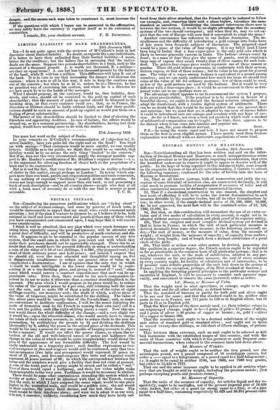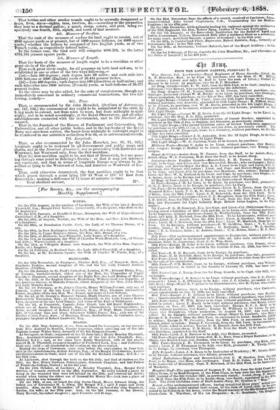DECIMAL MONEYS AND MEASURES,
London, 26th January 1858.
Sin—Notwithstanding all that has been written and said on the intro- duction of Decimal Moneys and Measures, so much misapprehension seems to be still prevalent as tolhe points really requiring consideration, that even the humblest endeavour to remove it ought to appear to deserve well of the public. In' the hope of being regarded in this indulgent light, your remark on the exquisite dryness of the details notwithstanding, I venture to submit the following summary, condensed for the sake of brevity into the form of Maxims or Resolutions.
1st, That as all known systems, both of numeration and (with the ex- ception of some Oriental) of notation also, are constructed decimally, it will tend much to promote facility of computation if measures of value and all other commercial measures be decimally constructed likewise.
2d, That if a duodecimal construction be also desired, the simplest and best mode of effecting it will be to make the lowest denomination in each measure divisible by the number twelve, but all its other denominations' by ten; • in other words, if the simple decimal series of 10, 1000000, 10,000' are. be not approved, the next beat will be the combined series of 12, 120, 1200, 12,000, &e.
3d, But that., as this combination will necessitate the use of an extra co- lumn and of two modes of calculation in every account, it ought not to be adopted without mature consideration and plain proof of its superior utility.
4th, That the simplest and most complete decimal system yet devised is that in force in France, in which the unit of each particular measure is derived decimally from some other measure, in the following (reversed) or- der.,—The unit of money, or the measure of value, from the measure of weight ; of weight from the measure of capacity ; of capacity from surface ; of surface from length; and of length from a decimal subdivision of a great circle of the globe. 5th, That until or sinless some other system be devised, possessing the like qualities in a superior degree, the French system ought to he regarded so far as practicable as the common basis of all particular systems ; that is to sayawhaterer the unit, Or the mode of subdivision, adopted in any par- ticular country or for any particular measure, the unit of every measure in every country ought, for- facility of calculatiou and of intercourse, to be if possible some definite proportion of the unit laid down in the system of France ; [with the exception, perhaps, of its Mint standard of fineness.]
"In applying the foregoing general principlee to the particular moneys and meathres of England, it will be necessary to consider each measure sepa- rately, and convenient to observe the same (reversed) order as before.
18t. Money, or Measure of ralue.
That the weight used in whit operations, or coinage, ought to be the same as that and for all other articles, as defined below. That the standard of fineness or purity for both gold and silver ought to be one and the same ; and that this standard ought to be, neither mine parts in ten as in France, nor 111 parts in 120 as in English silver, but 11 parts in 12 as in English gold."'
That the Mint piece of the three metals used, i.e. their relative values in nn-seignoraged coinage, ought to be-1 grain of gold = 15 grains of silver, and 1 grain of silver es40 grains of copper or bronze ; or, gold 1 ="eilver 15 = copper or bionze 600. That the monetary unit ought to be a decimal subdivision of the light unit either of standard gold or standard silver ; and ought not in lue to exceed twenty-five shillings, or fall short of fifteen, shillings, of present money. That between these extremes, such an unit ought to be selected as will best harmonize with the established usages of this country, and with the units of those countries with which it has greatest or most frequent com- mercial transactions, when reduced to the common basis laid down above, '2d. Measure of Weights. . That the unit of weight ought to be neither the troy pound, nor the avoirdupois pound, nor a pound composed of 16 avoirdupois ounces, but either a — equal to a kilogramme, or a pound ',ual to a half-kilogramme ; i.e. it ought to be equel to neither 5760, nor 7 nor 7680 troy grains, but either to 15,434 or 7717.
That one and the same measure ought to be applied to all articles what- ever that are bought or sold by weight, including the precious metals ; [but perhaps excepting pearls and precious stones.]
3d. Measure of Capacity.
That the units of the measure of capacity, for articles liquid and dry re- spectively, ought to be multiples, not of the present imperial pint of 34.659 cubic inches, but either of a quart (or stoup) equal to a litre, or of a pint equal to a half-litre, containing respectively 61.028 and 30.514 present cubic inches. That bottles and other similar vessels ought to be severally designated as fours, fives, sixes-eights, tens, twelves, &c.-according to the porportion they bear to a decimal gallon; a quart, stoup, octave, and pint, being re- spectively one fourth, fifth, eighth, and tenth of that measure.
4th. Measure of Surface.
That the unit of the measure of surface for land ought to consist, not of 4840 square varda as at present, but of 1000 square fathoms, (or 4000 square yards,) whether the fathom be composed of two English yards, or of two French yards, as respectively defined below.. In the former case, the land unit will comprise 4086.216, in the latter 4784.184 present square yards.
5th. Measure of Length.
That the basis of the measure of length ought to be a meridian or other great circle of the globe. That such great circle ought, for all purposes on both land and sea, to be subdivided in one or other of the two ways followinK,- (Ist)-Into 360 degrees ; each degree into 60 miles ; and each mile into 1000 fathoms or 2000 (English) yards of 36.454 present inches. (2d)-Into 400 degrees ; each degree into 100 kilometres or half-miles; and each kilometre into 1000 metres, (French) yards, or half-fathoms of 39.371 present inches. To the above may be also added, for the sake of completeness, though not immediately concerned in ordinary commercial transactions, the two fol- lowing, namely- 6th. Wone.
That, as recommended by Sir John Herschel, (Outlines of Astronomy, sec. 147, 935,) the astronomical day ought to be assimilated to the civil, by b-ing made to extend, not from noon to noon, but from midnight to mid- night ; and to be noted accordingly, at the Royal Observatory, and all other establishments connected with the Government, and in the Nautical Al- tnanaek, - That in the journals of the Houses of Parliament and Convocation the Universities, and all other public bodies, and in the log-books of the Convocation, Navy and merchant service, the hours from midnight to midnight ought to be numbered in one unbroken series from 0 to 24, as in astronomical records.
7th. Longitude.
That, as also recommended by Sir John Herschel, (sec. 90, 91, 935,) longitude ought to be reckoned in all Government and public maps and charts, and in the Nautical Alinanack, not as proceeding both Eastward and Westward, but Westward only, from the first meridian. That the first meridian ought to be, not that of Greenwich, but one pass- ing through some point in Behring's Straits ; so that it may not intersect any continent, and that in terms of longitude Europe may always be de- scribed as lying to the Westward of Asia, and America as Westward of Eu-
roSiat, until otherwise determined, the first meridian ought to be that which passes through a point lying 168 4.T West or 191° 15' East from Greenwich ; making a difference of 12 hours 45 minutes in time.
Your obedient servant,
[For BOOKS, &c., see the accompanying Monthly Supplement.]



































 Previous page
Previous page